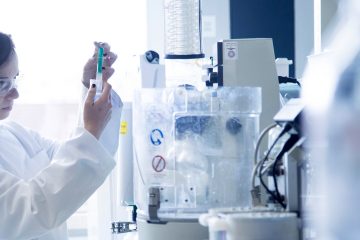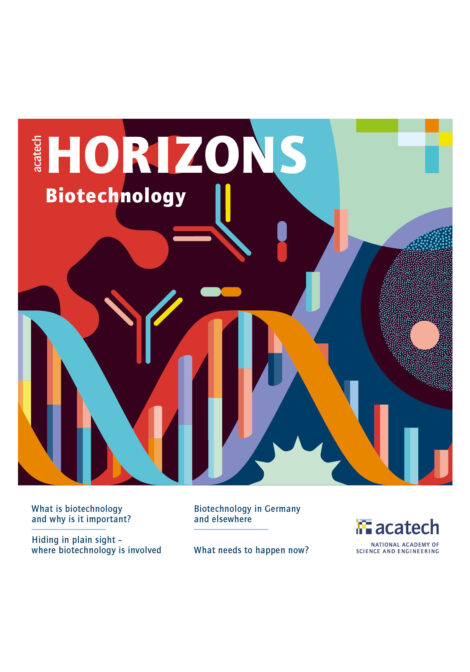acatech HORIZONS: Biotechnology
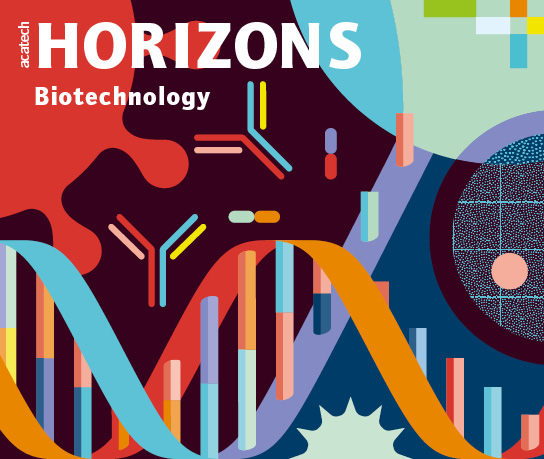
What do vanilla ice cream and a coronavirus vaccine have in common? Like many other everyday products such as bread, wine, apple juice, medicines, shampoo and even sneakers, they both involve biotechnology. But what exactly is biotechnology? It includes any industrial application using biological processes to manufacture a product. What changes has biotechnology seen over the centuries and where do we come across it today? And most importantly, how can it help us meet the challenges of the present and the future? acatech’s new HORIZONS Biotechnology answers these and other vital questions.
HORIZONS is also on LinkedIn. Follow us for “science in snacks”.
The acatech HORIZONS Podcast

“Late Night Tech” is a podcast for everyone who is up for science, technology and community insiders. Christina Müller-Markus and Dr. Sandra Fendl from the acatech HORIZONS team talk with well-known experts about current topics. A podcast from acatech, the National Academy of Science and Engineering.
What is biotechnology and why is it important?
Biology and technology – how do they fit together? We copy the way enzymes, cells and bacteria function from nature, and convert our observations into technological applications. Have you ever baked your own bread? Removed a stain from your trousers with gall soap or accidentally had milk go sour in the fridge? Congratulations! You have already, with variable success, put biotechnology to use. The above examples may sound mundane but are good illustrations of what the somewhat strange term biotechnology means; that is above all, manufacturing a product using microorganisms such as bacteria, fungi or enzymes and appropriate technology.
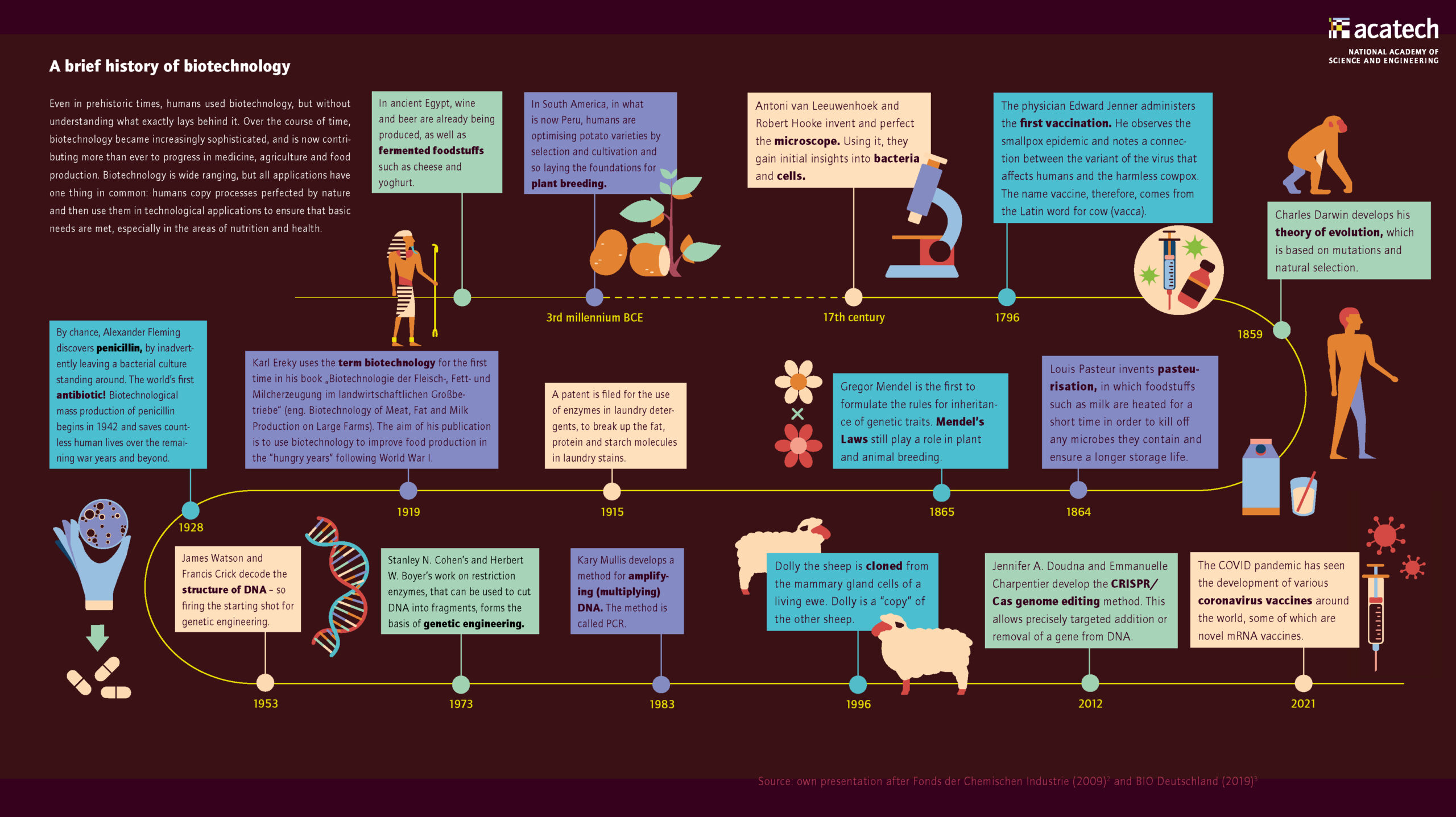
Did you realise that in almost every room of your home there will be at least one product that has been produced using biotechnological methods? Biotechnology is our constant companion and our daily life is now unthinkable without it.
Biotechnology in daily life
Humans have been using biotechnological processes for thousands of years. It is therefore unsurprising that many products currently in daily use are based on biotechnological methods. However, a large part of the general public is unaware of this. The following examples of biotechnological products used in daily life are just a small fraction of the plethora of biotechnological applications.
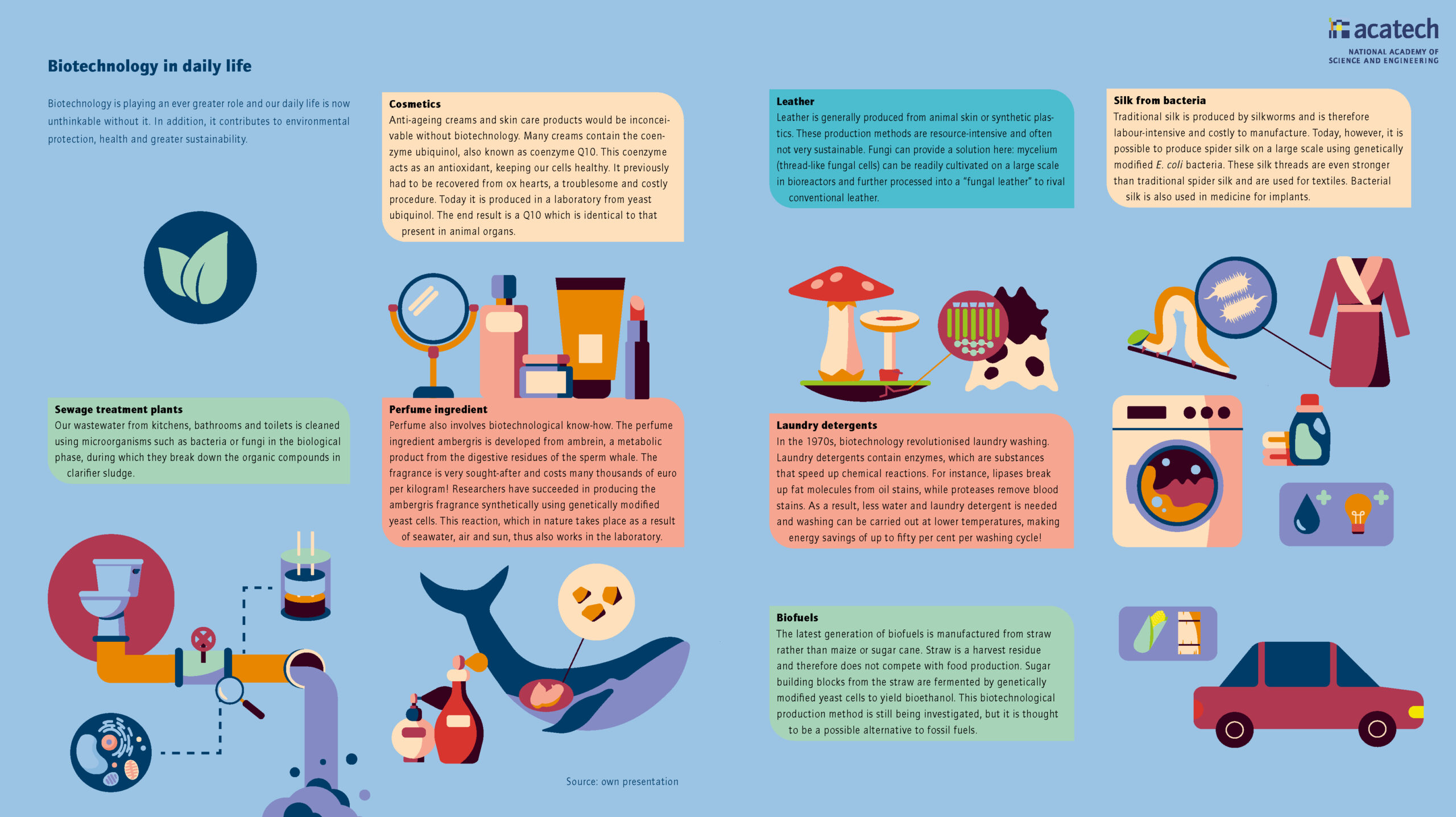
Palatable biotechnology
Biotechnology is modelled on nature, which over the course of evolution has optimised processes such as the production of sugars, amino acids, proteins and fats. Over time, nature’s systems have become ever more efficient overall, consuming ever less energy and only generating waste and residues which can be reused, so creating a closed circuit. Human beings recognised this early on and for thousands of years have been using biotechnological methods to produce, mature and preserve foodstuffs like bread, sauerkraut and wine. Biotechnology developed from observing natural processes: milk “turns” and goes sour, and fruit juice becomes vinegar or wine, depending on whether it is vinegar bacteria or yeasts that get the upper hand first. Humans have put these observations to good use and applied them in order to optimise production methods. In this way, biotechnology has conquered our kitchens.
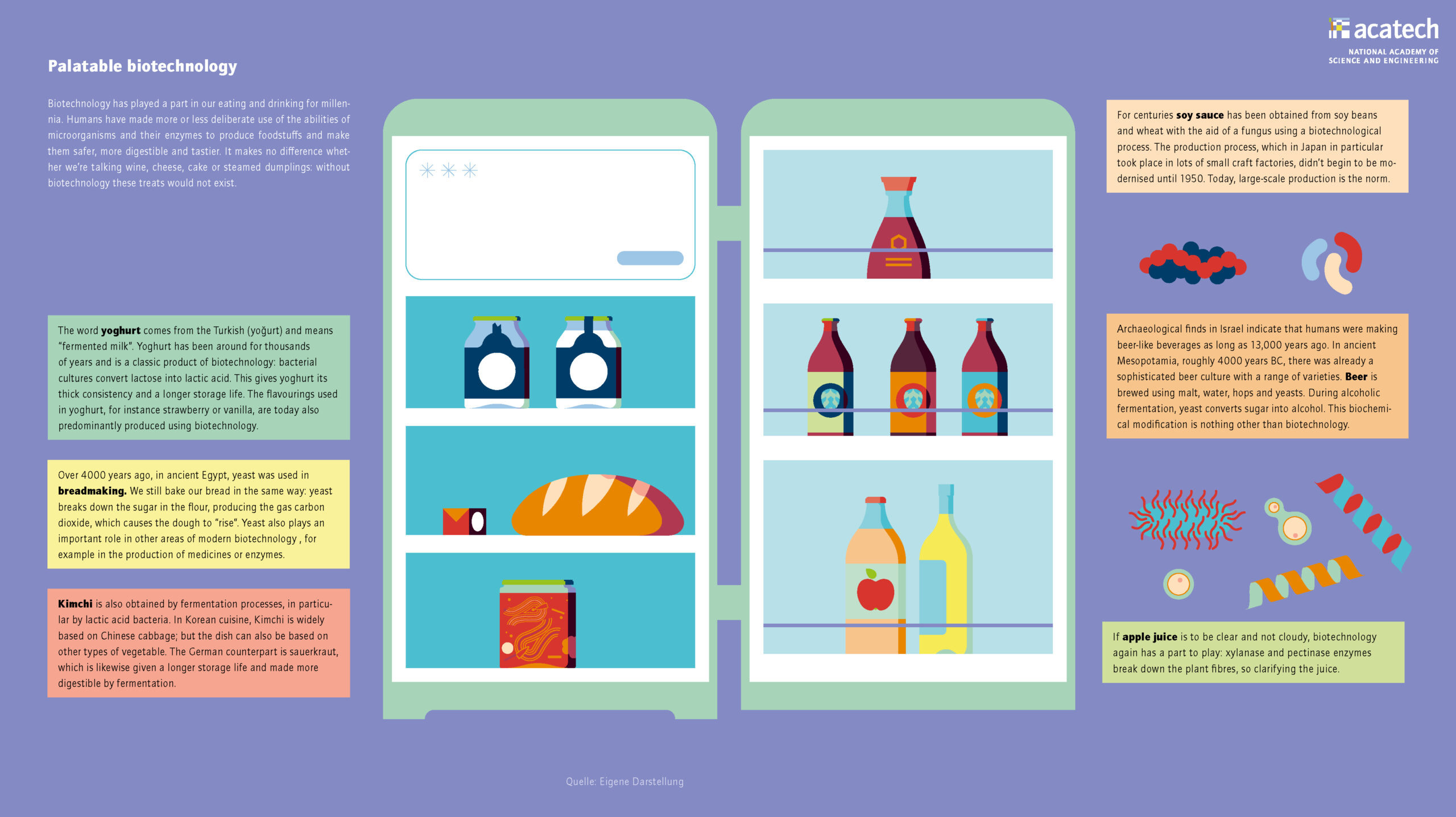
When it comes to nutrition, biotechnology offers innovative, sustainable possibilities for creating new products and at the same time countering climate change. The high and ever-growing consumption of meat makes a significant contribution to global warming: industrial meat production and intensive animal farming are responsible for 14 per cent of the world’s greenhouse gas emissions. Here too, biotechnology offers some alternatives: one future possibility is laboratory-grown meat, known as cultured meat. Current studies suggest that cultured meat uses less water and land than meat produced conventionally by farming. However, growing meat in a laboratory requires more energy, as it is currently only produced for research purposes. Processes are not yet optimized for industrial production, which is why so far no reliable final life cycle assessment is available.
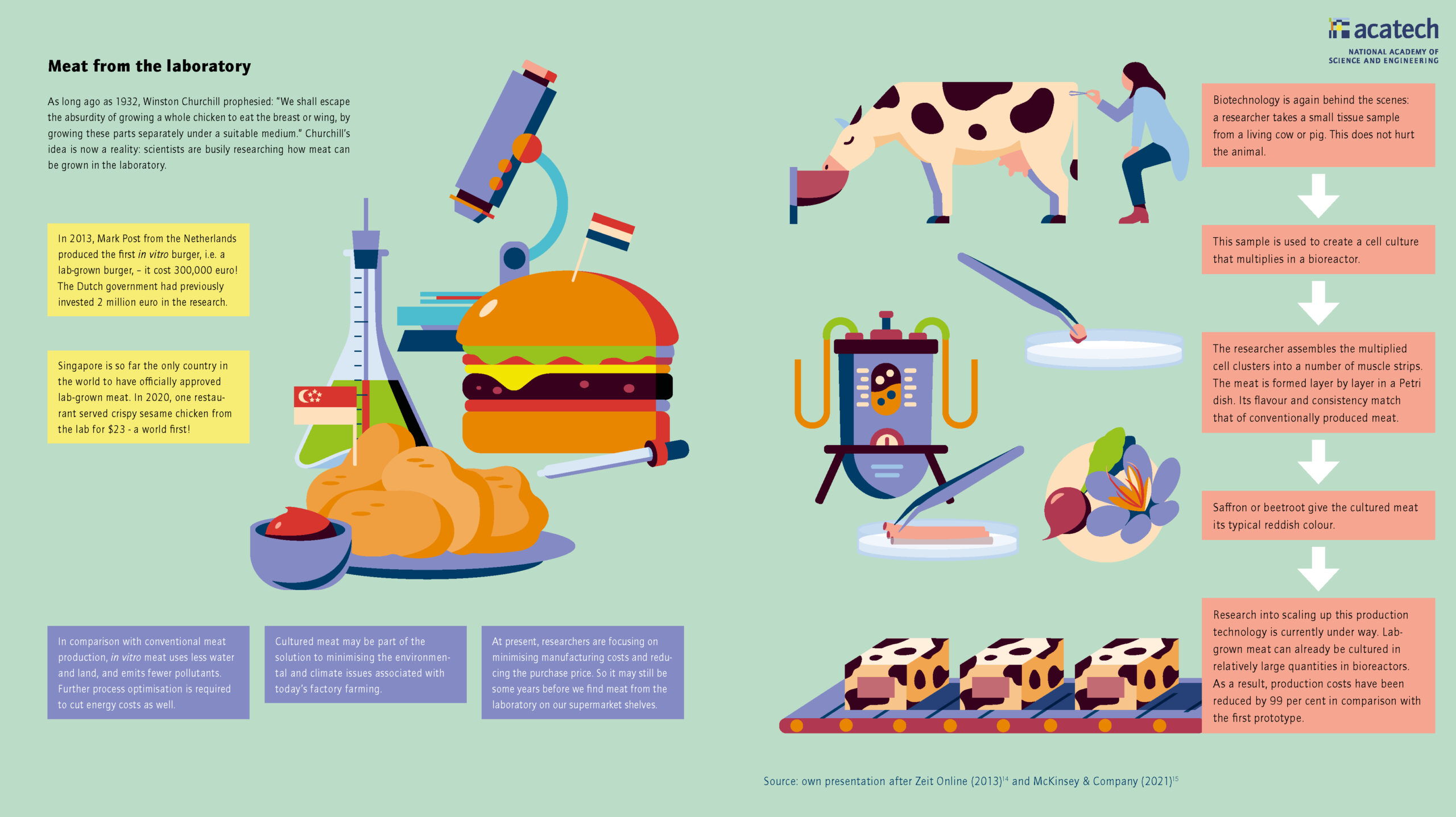
(Green) biotechnology in agriculture
The world’s population is growing steadily and estimates suggest that around ten billion people will be living on the planet by 2050, all of whom will need food. At the same time, resources are finite. How could biotechnology and genetic engineering help solve this problem?
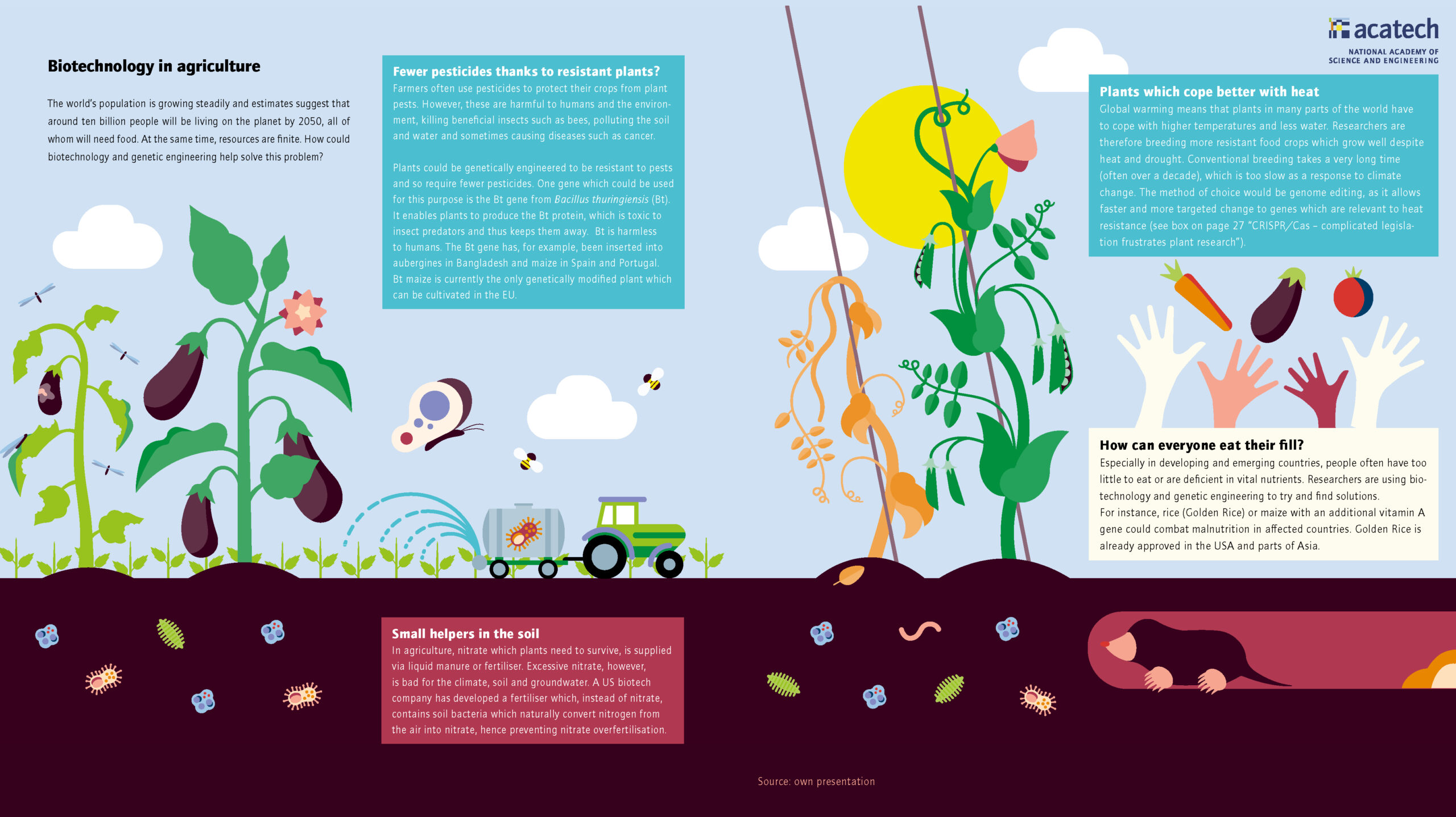
Biotechnology driving medical progress
In medicine, biotechnology now plays a key role in the diagnosis and treatment of disease. For instance, biotechnological methods are involved in the development of virtually all drugs that come onto the market today. This applies to every stage of drug development, from research the cause of diseases and underlying genes to the production of drugs using enzymes or bacteria. Genetic engineering is also one of the biotechnological methods used in medicine, being vital in the production of coronavirus vaccines or in cancer therapy:

The forgotten female pioneers of biotechnology
Women have been true pioneers in all areas of biotechnology. For example, the coronavirus was discovered and visualised back in the 1960s by the Scottish virologist June Almeida. Historically, however, the scientific achievements of women have often not been appreciated to the same extent as those of their male colleagues. For instance, the discovery of the double helix structure of DNA in 1953 is still predominantly attributed to James Watson and Francis Crick, despite the work of the British scientist Rosalind Franklin having contributed significantly to the two men’s findings. Unlike Crick and Watson, her achievements did not win her a Nobel prize, and biology textbooks frequently also fail to mention her.
Despite biology and biotechnology being the natural sciences in which women are most strongly represented in Germany, each with a share of around sixty percent, women are still underrepresented in leading scientific positions and hold only 27% of biology professorships in German universities. The same pattern can be seen in business, for example in biotech start-ups in Germany. The “Female Founders Report”, which looked at the founding teams for 150,000 start-ups, found that women accounted for 14.8 per cent of founders in “biotechnology and medicine” in 2020. So there is still a lot to be done to ensure that the achievements of female scientists and their innovative spirit conquer the biotech industry, especially in the executive ranks.

Germany in international comparison
Biotechnology is considered an important driver of progress in many countries. An important field of innovation is medicine, for example in research into COVID-19, cancer or other life-threatening diseases. Biomedical data from patients play a decisive role here; experts see this as the basis of tomorrow’s medicine. They offer researchers new opportunities to identify correlations, detect diseases before they break out and develop highly effective, personalised therapies. Finland and Great Britain already use biological medical databases: about 500,000 people here make their medical data available to research in a voluntary and pseudonymised data donation. In Germany, on the other hand, the development of medical databases is still in its beginnings.
However, experts agree that Germany is, overall one of the pioneers in biotechnology. In the COVID pandemic, for example, German companies, based on their findings from years of excellent research, were able to develop coronavirus vaccines and bring them to market within a very short time. The problem in Germany tends to be corporate financing, especially when making the leap from a start-up to a company with production scaled to large output volumes. Although the COVID pandemic has led to record levels of investment in biotech financing within Germany, they are still at a low level compared to other countries.
What needs to happen now?
What needs to happen now to ensure that the potential of biotechnology is fully exploited and of equal benefit to society, the economy and the environment? What do we have to do so that biotechnology helps us get a grip on humanity’s problems such as nutrition and climate change? And what role can government, business, research and society play in this?
Biotechnology can help us address the challenges facing humanity, such as nutrition and climate change. What can the state, companies, research and society do to ensure that the potential of biotechnology is fully exploited and that society, the economy and the environment benefit equally from it?
- Politics can play a decisive role in shaping the scope of biotechnology. Policy makers can show more willingness to take risks and rethink legal regulations to promote start-ups, other agile players and medium-sized companies. After all, lengthy, cost-intensive approval processes hinder innovation.
- Science and research are the motor and foundation of biotechnological progress. Their tasks are the rapid, transdisciplinary transfer of research results into application and the comprehensible communication of scientific concepts to society and politics to enable dialogue and opinion-forming.
- The economy has to venture more. The potential of biotechnology can hardly be raised in the short term; it needs patience, openness to new partners and financing models.
- Society actively shapes an open dialogue about opportunities, expectations and concerns with science and politics. They can bring about change both by expressing their opinions and through their consumption behaviour.
From politics to business and research to society, we have come all the way around. If all actors pull together, biotechnology offers enormous opportunities to shape our future in a sustainable, healthy and modern way.
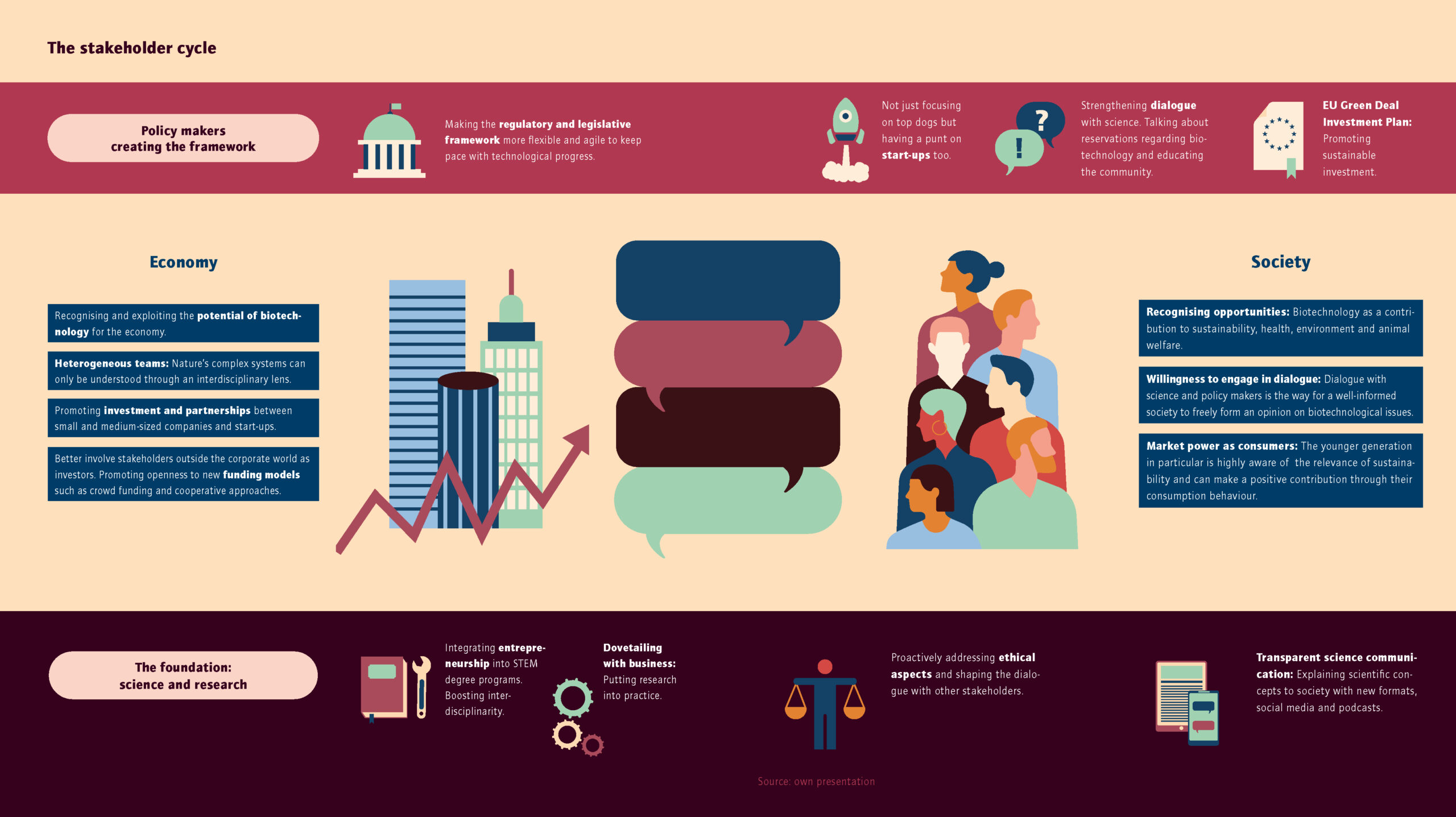
Project group
- Dr. Viola Bronsema
CEO BIO Deutschland - Prof. Dr. Andrea Büttner (head of project group)
Executive Director, Fraunhofer Institute for Process Engineering and Packaging (IVV) - Prof. Dr. Stefanie Heiden
Institute Director and Chair of the Institute of Innovation Research, Technology Management and Entrepreneurship ITE, Leibniz University Hannover - Prof. Dr. Peter Liggesmeyer
Chair of Software Engineering: Dependability, Kaiserslautern University of Technology - Dr. Guido Meurer
Member of the Board of Management, Brain Biotech AG - Prof. Dr. Thomas Scheper
Professor and Managing Director Institute of Technical Chemistry, Leibniz University Hannover - Dr. Petra Wicklandt
Head of Corporate Affairs and Senior Vice-President, Merck Group




